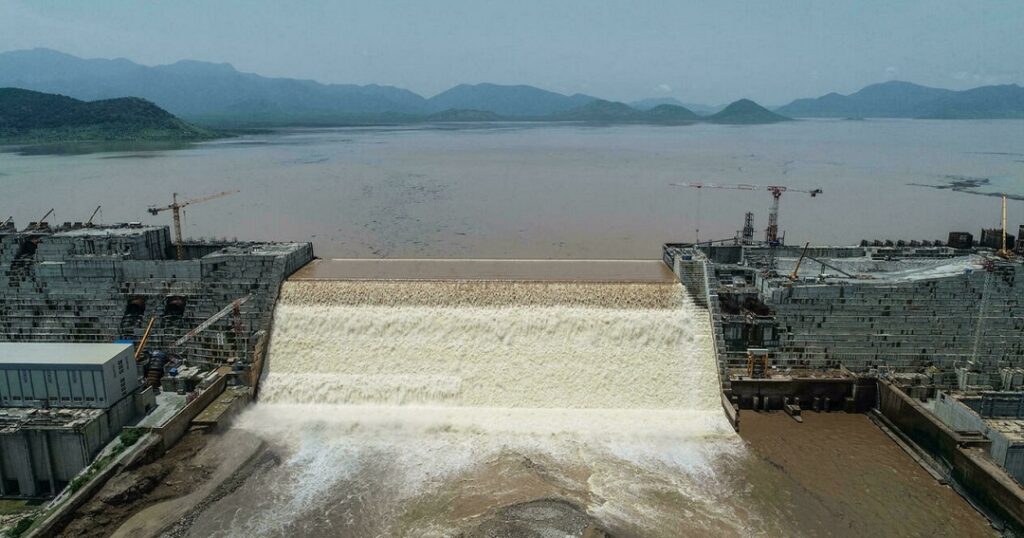- The Grand Ethiopian Renaissance Dam (GERD) impact on downstream nations Egypt and Sudan has turned the project into a geopolitical hotspot.
- The three countries expect to find common ground on the Nile dam’s construction in about four months.
- Egypt’s concerns are rooted in its dependence on the Nile waters for the livelihoods of its over 100 million people.
The Grand Ethiopian Renaissance Dam (GERD), perched on the Blue Nile, stands as a symbol of Ethiopia’s ambitions for progress, energy independence, and economic growth. However, the $4.6 billion dam’s colossal impact on downstream nations, particularly Egypt and Sudan, has transformed this engineering marvel into a geopolitical hotspot.
Negotiations over the fate of the GERD are back on, with leaders of Egypt, Ethiopia, and Sudan expressing their intent to find common ground within a four-month window.
The stakes are high. Egypt relies on the Nile’s waters for agricultural sustenance and the livelihoods of over 100 million people. The dam’s location in Ethiopia means that a significant 85 per cent of the Nile’s waters originate from this region. This geographical reality underscores the intricate balance between national development aspirations and shared transboundary resources.
Egypt, Ethiopia, Sudan talks on GERD resume
Egypt’s concerns are rooted in its dependence on the Nile waters for survival. The country’s Irrigation Ministry has advocated for a legally binding agreement that ensures the dam’s operations and reservoir filling does not endanger the delicate equilibrium Egypt relies upon.
This existential anxiety is exacerbated by Ethiopia’s plan to start filling the reservoir, an undertaking that took place before a comprehensive agreement was struck, further deepening tensions between Cairo and Addis Ababa.
Egypt’s intricate diplomacy, fortified by colonial-era agreements, has long safeguarded its share of the Nile’s waters. For decades, Cairo’s diplomatic maneuvers have effectively prevented upstream nations, including Ethiopia, from undertaking significant infrastructure projects on the Nile’s tributaries.
As a result, Ethiopia’s use of the river’s waters remained limited. This position perpetuated a sense of inequity, compelling Ethiopia to explore avenues that could emancipate its potential to tap into the Nile waters.
The dam’s conception was enabled not only by the Ethiopian government’s vision but also by the collective determination of Ethiopians both at home and abroad. Their willingness to invest in the project pushed the government to secure a substantial portion of the funds required for construction, especially from China. Specifically, Chinese Banks agreed to finance the acquisition of turbines and electrical equipment for the hydroelectric plants.
Read Also: Egypt’s Nile Delta fish industry feeling the heat of urbanization
Chinese-funded GERD
About a decade ago, whistleblower website Wikileaks, laid bare a 2010 message from Egypt’s ambassador to Lebanon. This message unveiled Egypt’s intention to take aggressive measures against the Chinese-funded GERD on the Blue Nile River—a move that lifted the veil on a complex web of historical agreements and geopolitical tensions.
Compounding the situation was Ethiopia’s decision to disregard a 1929 agreement—a colonial-era imposition orchestrated by British rulers—which granted Egypt a staggering 90 per cent control of the Nile’s waters. The British also bestowed Egypt with veto power over any dam projects that could potentially hinder water supplies.
In a unilateral decision in August 2022, Ethiopia announced it had completed the third phase of filling GERD.
Downstream nations, particularly Egypt, are concerned about the potential impacts on their water security and agricultural practices. In July, Abbas Sharaki, a Professor of Water Resources at Cairo University, warned that storing 25 billion cubic meters in the fourth filling of the GERD could affect farming on one million acres of farm across Egypt.
With the resumption of talks, Irrigation Minister Hani Sewilam emphasized the existence of “technical and legal solutions” to the dispute. However, details regarding these potential solutions remain unclear. The crux of the issue lies in determining how to allocate water downstream in times of severe drought and the mechanisms for resolving future disputes.
Reports indicate that Ethiopia has rejected the idea of binding arbitration at the final stages of the project, positioning its pursuit of energy security and development as non-negotiable goals.
Harnessing Ethiopia’s hydropower potential
Ethiopia’s assertion of the dam’s significance is not without merit. The lack of access to electricity affects a substantial portion of its population, and the GERD is envisioned as a lifeline that could propel the nation toward progress. As the global community advocates for sustainable development goals, Ethiopia’s case for harnessing its hydropower potential gains resonance.
On its part, Sudan, geographically positioned between Egypt and Ethiopia, brings yet another dimension to the conversation. Khartoum’s concerns revolve around the need for coordinated data sharing and operation transparency from Ethiopia to prevent flooding and safeguard its own power-generating dams on the Blue Nile.
The proximity of the GERD to the Sudanese border, just 10km away, intensifies the urgency of these concerns. Further, the complexities of the GERD negotiations have revealed the intricate web of interests and challenges intertwined with transboundary river management.
The Blue Nile’s course from Ethiopia, through Sudan, to Egypt’s Mediterranean shores underscores the shared nature of the resource.
As the talks resume, finding common ground is not just an exercise in diplomacy. It is a necessity to ensure sustainable development for all parties involved. Africa and the world will watch intently as these three nations navigate the turbulent waters of cooperation, competition, and the most inevitable; compromise.
GERD, once hailed as a beacon of progress, now embodies a call to strike a balance between national aspirations and the collective responsibility to steward harnessing of Nile’s waters for sustainable development.
As the clock ticks towards the four-month deadline, Africa holds its breath, hoping for an agreement that defies controversy and paves the way for shared prosperity.
